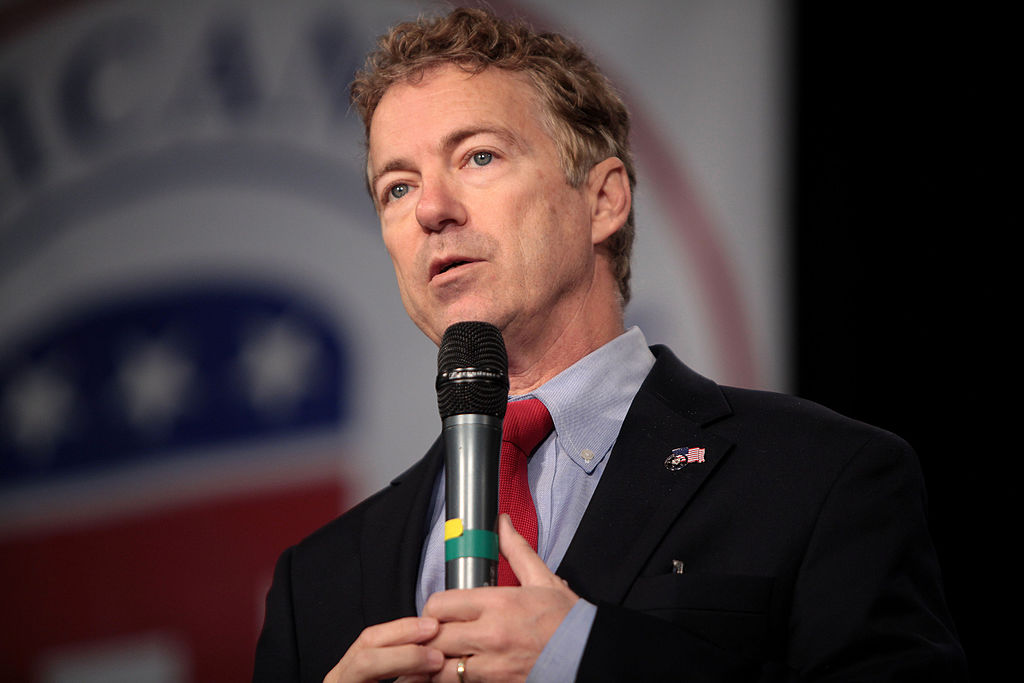Senator Rand Paul’s remarks have ignited a heated debate after suggesting that Denver Mayor Michael Hancock could face removal from office if he resists the Trump administration's deportation policies. Paul’s statement, delivered during a media appearance over the weekend, underscores the tension between federal immigration enforcement and local government autonomy.
A Clash of Policies
Denver, like many major U.S. cities, operates as a sanctuary city—a designation that limits cooperation with federal immigration authorities. Mayor Hancock has been a vocal advocate of protecting undocumented immigrants and has previously resisted federal efforts to enforce mass deportations within the city.
Paul’s comments come as President-elect Donald Trump signals plans to ramp up immigration enforcement during his second term. Trump’s administration has pledged to target sanctuary cities with federal sanctions and increased Immigration and Customs Enforcement (ICE) operations.
The Controversial Statement
While Paul did not elaborate on the mechanism by which Hancock might be removed, his statement has sparked questions about the federal government’s authority over locally elected officials. Legal experts argue that removing a mayor for opposing federal policy would require significant legal justification and is unlikely to succeed under current constitutional protections.
Paul’s comments have drawn widespread criticism, with opponents accusing him of undermining local governance and constitutional checks and balances. Supporters, however, argue that sanctuary city policies violate federal law and need to be challenged.
Denver’s Response
Mayor Hancock responded to Paul’s remarks by reaffirming Denver’s commitment to its sanctuary policies. “Our city will continue to stand for fairness and justice,” Hancock stated in a press release. “We are not in the business of breaking families apart.”
Hancock’s office has also pointed out that Denver has maintained a cooperative relationship with federal agencies on criminal matters unrelated to immigration, emphasizing that the city’s policies are designed to build trust between law enforcement and immigrant communities.
Legal Challenges Ahead
The legal landscape surrounding sanctuary cities remains complex. While federal courts have previously blocked Trump administration attempts to withhold funding from sanctuary jurisdictions, legal experts warn that new legislative efforts could reignite the battle.
“Federal overreach in local governance has always been a contentious issue,” said Professor Mark Benton, a constitutional law expert. “Any attempt to remove an elected official for opposing federal policy would face significant constitutional challenges.”
Public Reactions on Social Media
Paul’s remarks have sparked a wave of reactions on social media, with netizens offering divided opinions:
- @MileHighJustice: “Rand Paul has no right to threaten our mayor. Denver stands strong for immigrant rights!”
- @BuildTheWall2024: “Sanctuary cities are breaking federal laws. Rand Paul is 100% right to call this out.”
- @LegalExpertJo: “Federal threats to remove elected officials are unconstitutional. This is political theater at its worst.”
- @ImmigrantVoicesCO: “Denver is a safe haven for many. We support Mayor Hancock against these baseless attacks.”
- @ConstitutionalWatcher: “Rand Paul’s overreach is dangerous for democracy. Local leaders are not federal puppets.”
- @TruePatriot90: “Finally someone is standing up to these sanctuary cities undermining law and order.”
What’s Next?
As Trump’s administration gears up for its second term, sanctuary cities like Denver are bracing for intensified legal and political battles. Paul’s statement has highlighted the growing divide between federal immigration enforcement priorities and local government policies.
While the likelihood of removing Mayor Hancock remains slim, the controversy underscores the broader conflict over immigration policy, a key issue that will likely dominate headlines in the years ahead.



 Australian PM Calls Alleged Western Australia Terror Plot “Deeply Shocking” After Arrest
Australian PM Calls Alleged Western Australia Terror Plot “Deeply Shocking” After Arrest  Zelenskiy Urges Change in Iran After U.S. and Israeli Strikes, Cites Drone Support for Russia
Zelenskiy Urges Change in Iran After U.S. and Israeli Strikes, Cites Drone Support for Russia  Pentagon to Halt Ivy League Programs for U.S. Military Officers Starting 2026
Pentagon to Halt Ivy League Programs for U.S. Military Officers Starting 2026  Israel Launches Fresh Strikes on Iran After Death of Supreme Leader Ayatollah Khamenei
Israel Launches Fresh Strikes on Iran After Death of Supreme Leader Ayatollah Khamenei  Netanyahu Suggests Iran’s Supreme Leader Khamenei May Have Been Killed in Israeli-U.S. Strikes
Netanyahu Suggests Iran’s Supreme Leader Khamenei May Have Been Killed in Israeli-U.S. Strikes  UK Accepts U.S. Request to Use British Bases for Defensive Strikes on Iranian Missiles
UK Accepts U.S. Request to Use British Bases for Defensive Strikes on Iranian Missiles  Trump to Address Nation as U.S. Launches Strikes in Iran, Axios Reports
Trump to Address Nation as U.S. Launches Strikes in Iran, Axios Reports  EU Urges Maximum Restraint in Iran Conflict Amid Fears of Regional Escalation and Oil Supply Disruption
EU Urges Maximum Restraint in Iran Conflict Amid Fears of Regional Escalation and Oil Supply Disruption  Germany and China Reaffirm Open Trade and Strategic Partnership in Landmark Beijing Visit
Germany and China Reaffirm Open Trade and Strategic Partnership in Landmark Beijing Visit  Macron Urges Emergency UN Security Council Meeting as US-Israel Strikes on Iran Escalate Middle East Tensions
Macron Urges Emergency UN Security Council Meeting as US-Israel Strikes on Iran Escalate Middle East Tensions  U.S.-Israel Strike on Iran Escalates Middle East Conflict, Trump Claims Khamenei Killed
U.S.-Israel Strike on Iran Escalates Middle East Conflict, Trump Claims Khamenei Killed  Australia Rules Out Military Involvement in Iran Conflict as Middle East Tensions Escalate
Australia Rules Out Military Involvement in Iran Conflict as Middle East Tensions Escalate  Pentagon Leaders Monitor U.S. Iran Operation from Mar-a-Lago
Pentagon Leaders Monitor U.S. Iran Operation from Mar-a-Lago  Trump Says U.S. Attacks on Iran Will Continue, Warns of More American Casualties
Trump Says U.S. Attacks on Iran Will Continue, Warns of More American Casualties  HHS Adds New Members to Vaccine Advisory Panel Amid Legal and Market Uncertainty
HHS Adds New Members to Vaccine Advisory Panel Amid Legal and Market Uncertainty  Trump Says U.S. Combat Operations in Iran Will Continue Until Objectives Are Met
Trump Says U.S. Combat Operations in Iran Will Continue Until Objectives Are Met  Pakistan-Afghanistan Tensions Escalate as Taliban Offer Talks After Airstrikes
Pakistan-Afghanistan Tensions Escalate as Taliban Offer Talks After Airstrikes 































